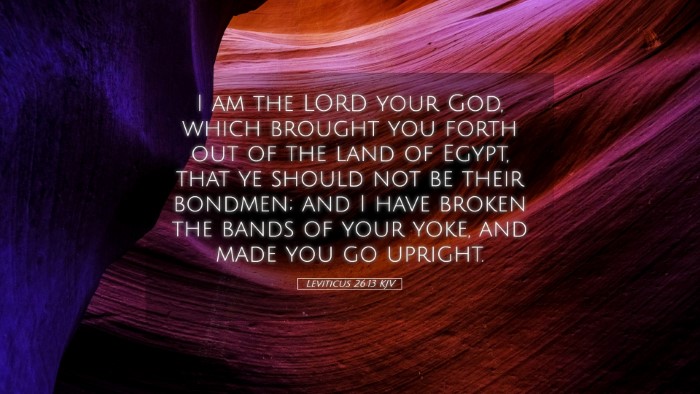Commentary on Leviticus 26:13
Verse: "I am the Lord your God, who brought you out of the land of Egypt, that you should not be their slaves; and I have broken the bars of your yoke and made you walk upright." (Leviticus 26:13, NKJV)
Introduction
The passage in Leviticus 26:13 is a powerful testament to God's deliverance and covenant relationship with Israel. It emphasizes God's role as emancipator and divine leader who not only frees His people from slavery but also guides them toward a life of righteousness and freedom. In this commentary, we will synthesize insights from various public domain commentaries, including those of Matthew Henry, Albert Barnes, and Adam Clarke, to extract deep theological meaning from this verse.
Theological Significance
1. Divine Authority and Recognition: The declaration "I am the Lord your God" affirms God’s sovereignty and authority over Israel. Matthew Henry emphasizes that the phrase illustrates God’s ongoing relationship with His people, reminding them of His commitment to their well-being. God's self-identification serves as an important reminder to Israel that they are not merely a free people but are now participants in a covenantal relationship with their Creator.
2. Historical Context of Deliverance: The reference to the exodus from Egypt is crucial. Adam Clarke highlights that the deliverance from Egyptian bondage wasn't just about physical freedom but also spiritual redemption. God reminds Israel that their liberation was not an end in itself but the beginning of their identity as God’s chosen people, tasked with living according to His statutes.
3. The Breaking of Yokes: The phrase "I have broken the bars of your yoke" indicates a complete liberation from oppressors. Albert Barnes draws attention to the symbolic meaning of "yoke" as the burdens of sin and oppression. It denotes God's power to not only liberate but also to empower Israel to live in a manner that reflects their divine calling. This breaking signifies a move from servitude to freedom, which is foundational in understanding God’s work in the lives of believers.
Practical Applications
1. Understanding God’s Deliverance: This verse serves as a profound reminder for individuals and communities that God is actively engaged in liberating His people. Pastors may find this verse to be a source of encouragement for congregations struggling with various forms of oppression, be it personal sin or societal injustice.
2. Identity in Covenant Relationship: For students and theologians, it raises questions about identity, belonging, and responsibility within the covenant. The acknowledgment of God as the deliverer in our lives prompts us to reflect on what it means to live as His people. The relationship established demands a response of loyalty and obedience, prompting discussions on grace and works.
3. Living Uprightly: The phrase "made you walk upright" evokes an ethical dimension to their emancipation. It is not sufficient to be free from physical chains; the expectation is to pursue a life marked by integrity, righteousness, and obedience to God’s laws. Henry would argue that this holistic approach to freedom encompasses both spiritual and moral dimensions, urging readers to embody the transformative power of God’s liberation in their lives.
Conclusion
In Leviticus 26:13, God encapsulates the essence of His relationship with Israel—one of deliverance, empowerment, and expectation. This verse serves as a reminder of God’s faithfulness and a call to respond with lives that reflect His character. For pastors, students, and theologians alike, the implications of this verse invite into discussions about liberation, identity, and ethical living in light of God's merciful grace.


